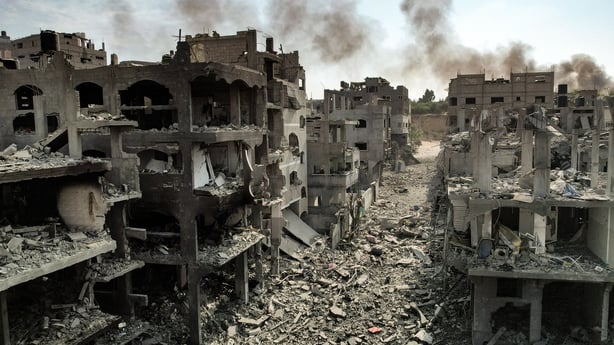The Gaza war will be the first item on the agenda during a long-awaited and contentious meeting between Israel and the EU at the end of February, RTÉ News understands.
The holding of the EU-Israel Association Council on 27 Febuary marks the culmination of months of divisive discussions at EU level, which began with a request by Ireland and Spain for the EU to consider suspending parts of the trade and political relationship with Israel.
Dublin and Madrid argued that, owing to its conduct in the Gaza war, Israel could be in breach of the human rights aspects of the EU-Israel Association Agreement, which governs bilateral and trade relations.
However, several member states such as Germany, Hungary, Austria and the Czech Republic, for months resisted the idea of assessing whether Israel was in breach of Article 2 of the Association Agreement, which binds both sides to complying with human rights and international humanitarian law.
Due to unanimity rules, the EU's foreign policy chief at the time, Josep Borrell, who personally supported the move, was unable to garner a consensus.
Without a consensus, it was not possible for the European Commission to start its assessment as to whether or not Israel could be in breach.
It is understood that while Israel was open to convening the EU-Israel Association Council - the forum which is supposed to bring both sides together annually - it resisted having the question of the human rights clause raised.

Sources have confirmed that deepening enmity between Tel Aviv and Mr Borrell, who became increasingly outspoken in his criticism of the Israeli government over Gaza, also held up the meeting between the EU and Israel.
It was only when Mr Borrell’s term of office came to an end in November, when he was succeeded by the former Estonian prime minister Kaja Kallas, that Israel signalled the meeting could go ahead, sources have suggested.
However, it's understood that Israel was unhappy about the notion of having Gaza as the first item on the agenda. Israel’s preference was to focus on the regional threat posed by Iran.
It has now transpired, however, that Israel has accepted that Gaza will be the first item on the agenda.
Diplomats have confirmed that Ireland and Spain, and perhaps others, will be in a position to raise the question of Article 2 during the meeting.
The agenda, seen by RTE News, includes the following: Conflict in Gaza, Israel-Palestine relations; regional issues, including Iran; global issues; EU-Israel bilateral relations.
Read more: Israel strikes Gaza hours after ceasefire announcement
Officials say member states will hold talks in the coming weeks to adopt a common EU position ahead of the gathering, which will comprise 27 EU foreign ministers, Kaja Kallas and the Israeli delegation - led by foreign minister Israel Katz.
The EU side is expected to raise the two-state solution, activities by violent Israeli settlers in the West Bank, and Lebanon and Syria.
Ms Kallas has also sought to hold a high-level meeting between the EU and the Palestinian Authority shortly after the meeting with Israel.
It's also understood that member states are hoping Israel and the Palestinian side will agree to the return of an EU mission to monitor the Egypt-Gaza border at Rafah.
The EU Border Assistance Mission for the Rafah Crossing Point (EUBAM Rafah) is a civilian mission originally designed to support the Palestinian Authority border agencies.
It was set up in 2005 but was suspended after the violent takeover of Gaza from the Palestinian Authority by Hamas.
Despite months of division over Ireland and Spain’s request for Israel to be potentially sanctioned by the EU over its conduct in Gaza, Irish officials are said to be pleased that the meeting is finally taking place and that Gaza will be the first item on the agenda.
While the EU was not involved in the Israel-Hamas ceasefire negotiations, it is expected Europe will play a significant role in the reconstruction of Gaza, in partnership with Gulf states.






